Positive Parenting's Influence on Child Psychology: A Review
VerifiedAdded on 2022/08/22
|12
|3678
|19
Essay
AI Summary
This essay delves into the significant impact of positive parenting on a child's psychological development. It explores the core principles of developmental psychology, emphasizing the crucial role of parents in shaping a child's mental, emotional, and social well-being. The essay examines the importance of creating a nurturing and supportive environment, highlighting the effects of various parenting styles, including Baumrind's typology, and the significance of secure attachment. It discusses the benefits of positive reinforcement, clear communication, and consistent discipline, while also addressing the potential negative consequences of harsh parenting techniques. Furthermore, it connects positive parenting with the principles of positive psychology, emphasizing the importance of fostering a child's strengths, resilience, and overall well-being. The essay underscores the long-term positive effects of positive parenting, including improved academic performance, better social skills, and enhanced emotional stability, providing a comprehensive overview of how parents can effectively contribute to their child's healthy psychological development.
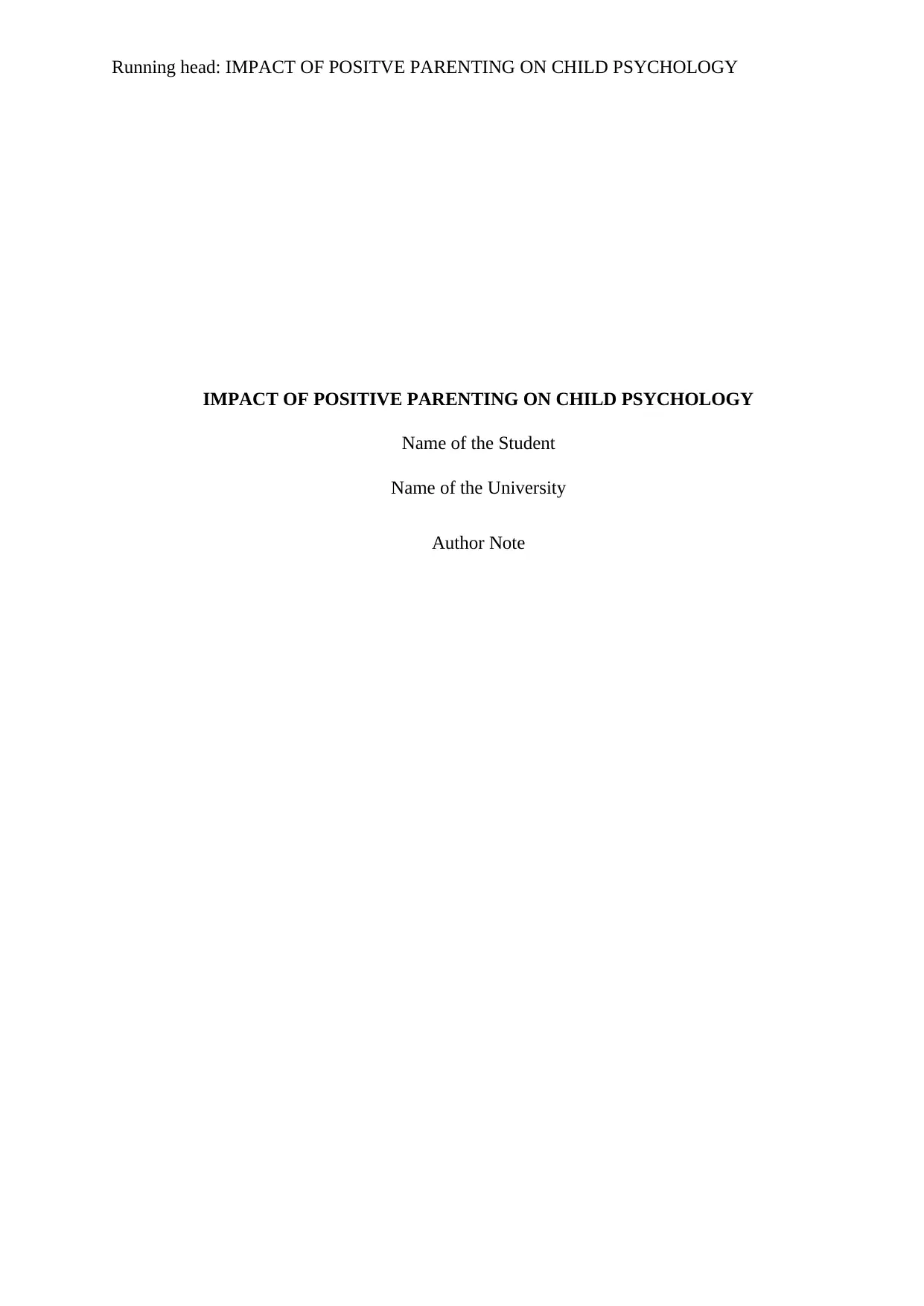
Running head: IMPACT OF POSITVE PARENTING ON CHILD PSYCHOLOGY
IMPACT OF POSITIVE PARENTING ON CHILD PSYCHOLOGY
Name of the Student
Name of the University
Author Note
IMPACT OF POSITIVE PARENTING ON CHILD PSYCHOLOGY
Name of the Student
Name of the University
Author Note
Paraphrase This Document
Need a fresh take? Get an instant paraphrase of this document with our AI Paraphraser
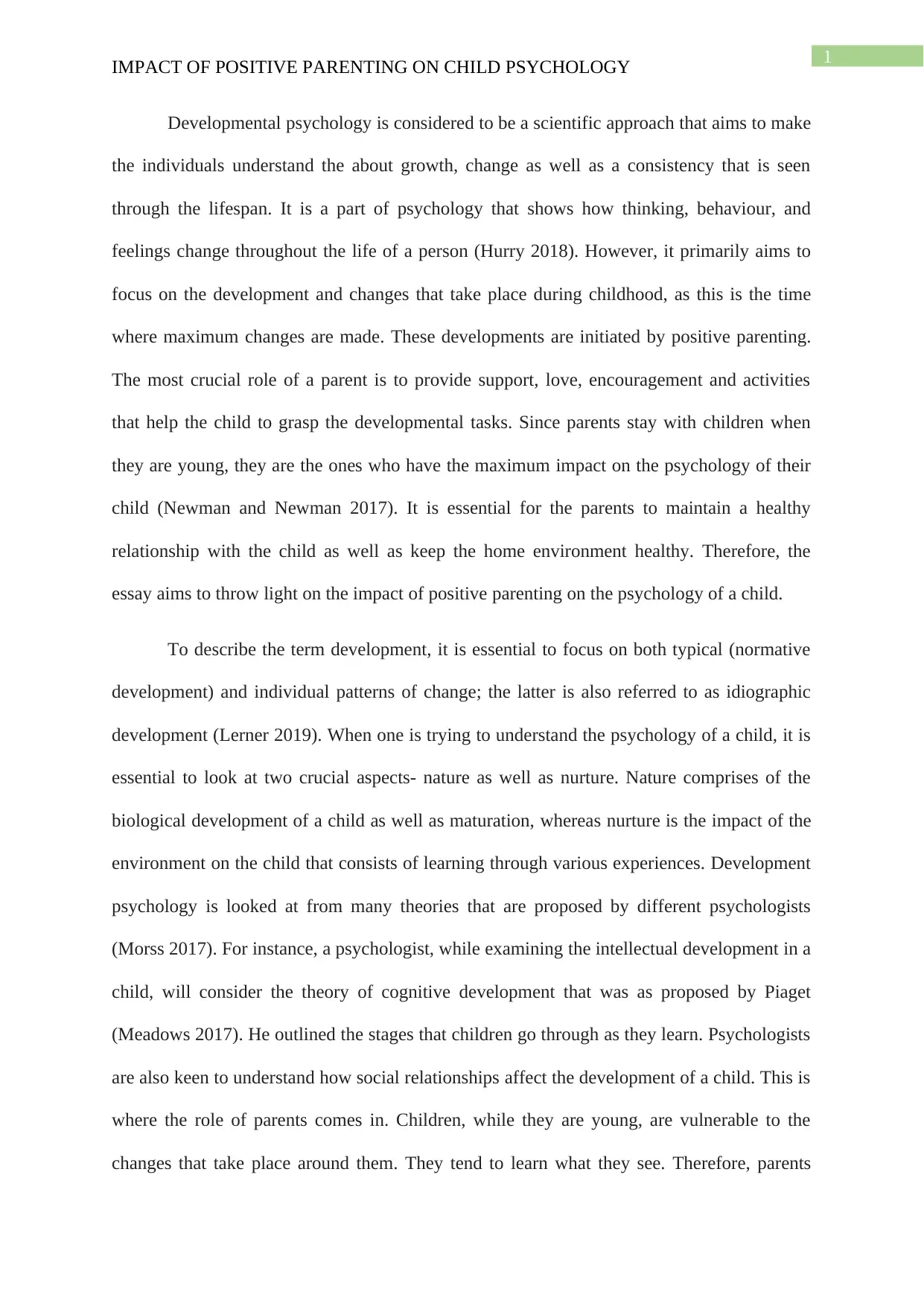
1
IMPACT OF POSITIVE PARENTING ON CHILD PSYCHOLOGY
Developmental psychology is considered to be a scientific approach that aims to make
the individuals understand the about growth, change as well as a consistency that is seen
through the lifespan. It is a part of psychology that shows how thinking, behaviour, and
feelings change throughout the life of a person (Hurry 2018). However, it primarily aims to
focus on the development and changes that take place during childhood, as this is the time
where maximum changes are made. These developments are initiated by positive parenting.
The most crucial role of a parent is to provide support, love, encouragement and activities
that help the child to grasp the developmental tasks. Since parents stay with children when
they are young, they are the ones who have the maximum impact on the psychology of their
child (Newman and Newman 2017). It is essential for the parents to maintain a healthy
relationship with the child as well as keep the home environment healthy. Therefore, the
essay aims to throw light on the impact of positive parenting on the psychology of a child.
To describe the term development, it is essential to focus on both typical (normative
development) and individual patterns of change; the latter is also referred to as idiographic
development (Lerner 2019). When one is trying to understand the psychology of a child, it is
essential to look at two crucial aspects- nature as well as nurture. Nature comprises of the
biological development of a child as well as maturation, whereas nurture is the impact of the
environment on the child that consists of learning through various experiences. Development
psychology is looked at from many theories that are proposed by different psychologists
(Morss 2017). For instance, a psychologist, while examining the intellectual development in a
child, will consider the theory of cognitive development that was as proposed by Piaget
(Meadows 2017). He outlined the stages that children go through as they learn. Psychologists
are also keen to understand how social relationships affect the development of a child. This is
where the role of parents comes in. Children, while they are young, are vulnerable to the
changes that take place around them. They tend to learn what they see. Therefore, parents
IMPACT OF POSITIVE PARENTING ON CHILD PSYCHOLOGY
Developmental psychology is considered to be a scientific approach that aims to make
the individuals understand the about growth, change as well as a consistency that is seen
through the lifespan. It is a part of psychology that shows how thinking, behaviour, and
feelings change throughout the life of a person (Hurry 2018). However, it primarily aims to
focus on the development and changes that take place during childhood, as this is the time
where maximum changes are made. These developments are initiated by positive parenting.
The most crucial role of a parent is to provide support, love, encouragement and activities
that help the child to grasp the developmental tasks. Since parents stay with children when
they are young, they are the ones who have the maximum impact on the psychology of their
child (Newman and Newman 2017). It is essential for the parents to maintain a healthy
relationship with the child as well as keep the home environment healthy. Therefore, the
essay aims to throw light on the impact of positive parenting on the psychology of a child.
To describe the term development, it is essential to focus on both typical (normative
development) and individual patterns of change; the latter is also referred to as idiographic
development (Lerner 2019). When one is trying to understand the psychology of a child, it is
essential to look at two crucial aspects- nature as well as nurture. Nature comprises of the
biological development of a child as well as maturation, whereas nurture is the impact of the
environment on the child that consists of learning through various experiences. Development
psychology is looked at from many theories that are proposed by different psychologists
(Morss 2017). For instance, a psychologist, while examining the intellectual development in a
child, will consider the theory of cognitive development that was as proposed by Piaget
(Meadows 2017). He outlined the stages that children go through as they learn. Psychologists
are also keen to understand how social relationships affect the development of a child. This is
where the role of parents comes in. Children, while they are young, are vulnerable to the
changes that take place around them. They tend to learn what they see. Therefore, parents
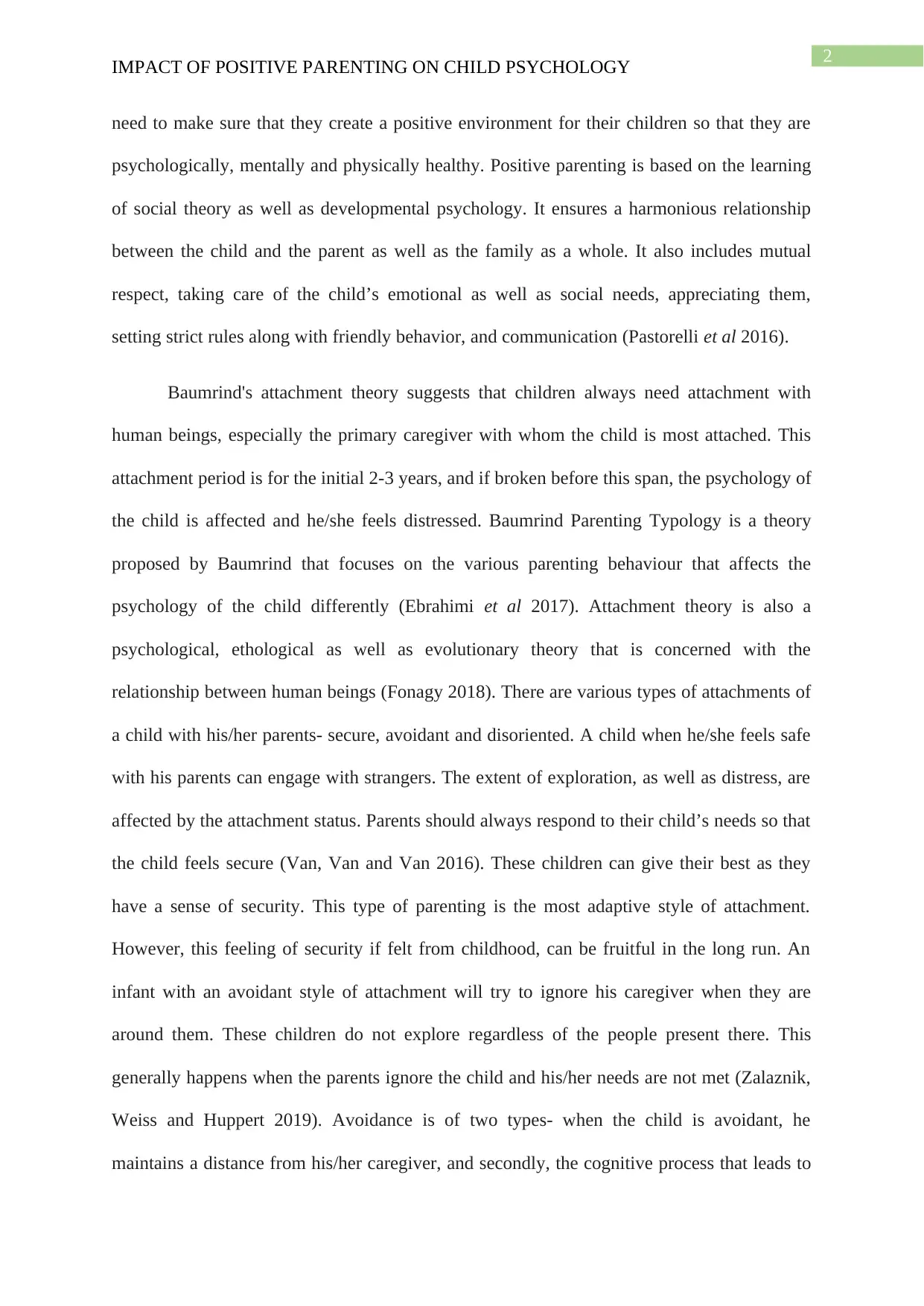
2
IMPACT OF POSITIVE PARENTING ON CHILD PSYCHOLOGY
need to make sure that they create a positive environment for their children so that they are
psychologically, mentally and physically healthy. Positive parenting is based on the learning
of social theory as well as developmental psychology. It ensures a harmonious relationship
between the child and the parent as well as the family as a whole. It also includes mutual
respect, taking care of the child’s emotional as well as social needs, appreciating them,
setting strict rules along with friendly behavior, and communication (Pastorelli et al 2016).
Baumrind's attachment theory suggests that children always need attachment with
human beings, especially the primary caregiver with whom the child is most attached. This
attachment period is for the initial 2-3 years, and if broken before this span, the psychology of
the child is affected and he/she feels distressed. Baumrind Parenting Typology is a theory
proposed by Baumrind that focuses on the various parenting behaviour that affects the
psychology of the child differently (Ebrahimi et al 2017). Attachment theory is also a
psychological, ethological as well as evolutionary theory that is concerned with the
relationship between human beings (Fonagy 2018). There are various types of attachments of
a child with his/her parents- secure, avoidant and disoriented. A child when he/she feels safe
with his parents can engage with strangers. The extent of exploration, as well as distress, are
affected by the attachment status. Parents should always respond to their child’s needs so that
the child feels secure (Van, Van and Van 2016). These children can give their best as they
have a sense of security. This type of parenting is the most adaptive style of attachment.
However, this feeling of security if felt from childhood, can be fruitful in the long run. An
infant with an avoidant style of attachment will try to ignore his caregiver when they are
around them. These children do not explore regardless of the people present there. This
generally happens when the parents ignore the child and his/her needs are not met (Zalaznik,
Weiss and Huppert 2019). Avoidance is of two types- when the child is avoidant, he
maintains a distance from his/her caregiver, and secondly, the cognitive process that leads to
IMPACT OF POSITIVE PARENTING ON CHILD PSYCHOLOGY
need to make sure that they create a positive environment for their children so that they are
psychologically, mentally and physically healthy. Positive parenting is based on the learning
of social theory as well as developmental psychology. It ensures a harmonious relationship
between the child and the parent as well as the family as a whole. It also includes mutual
respect, taking care of the child’s emotional as well as social needs, appreciating them,
setting strict rules along with friendly behavior, and communication (Pastorelli et al 2016).
Baumrind's attachment theory suggests that children always need attachment with
human beings, especially the primary caregiver with whom the child is most attached. This
attachment period is for the initial 2-3 years, and if broken before this span, the psychology of
the child is affected and he/she feels distressed. Baumrind Parenting Typology is a theory
proposed by Baumrind that focuses on the various parenting behaviour that affects the
psychology of the child differently (Ebrahimi et al 2017). Attachment theory is also a
psychological, ethological as well as evolutionary theory that is concerned with the
relationship between human beings (Fonagy 2018). There are various types of attachments of
a child with his/her parents- secure, avoidant and disoriented. A child when he/she feels safe
with his parents can engage with strangers. The extent of exploration, as well as distress, are
affected by the attachment status. Parents should always respond to their child’s needs so that
the child feels secure (Van, Van and Van 2016). These children can give their best as they
have a sense of security. This type of parenting is the most adaptive style of attachment.
However, this feeling of security if felt from childhood, can be fruitful in the long run. An
infant with an avoidant style of attachment will try to ignore his caregiver when they are
around them. These children do not explore regardless of the people present there. This
generally happens when the parents ignore the child and his/her needs are not met (Zalaznik,
Weiss and Huppert 2019). Avoidance is of two types- when the child is avoidant, he
maintains a distance from his/her caregiver, and secondly, the cognitive process that leads to
⊘ This is a preview!⊘
Do you want full access?
Subscribe today to unlock all pages.

Trusted by 1+ million students worldwide
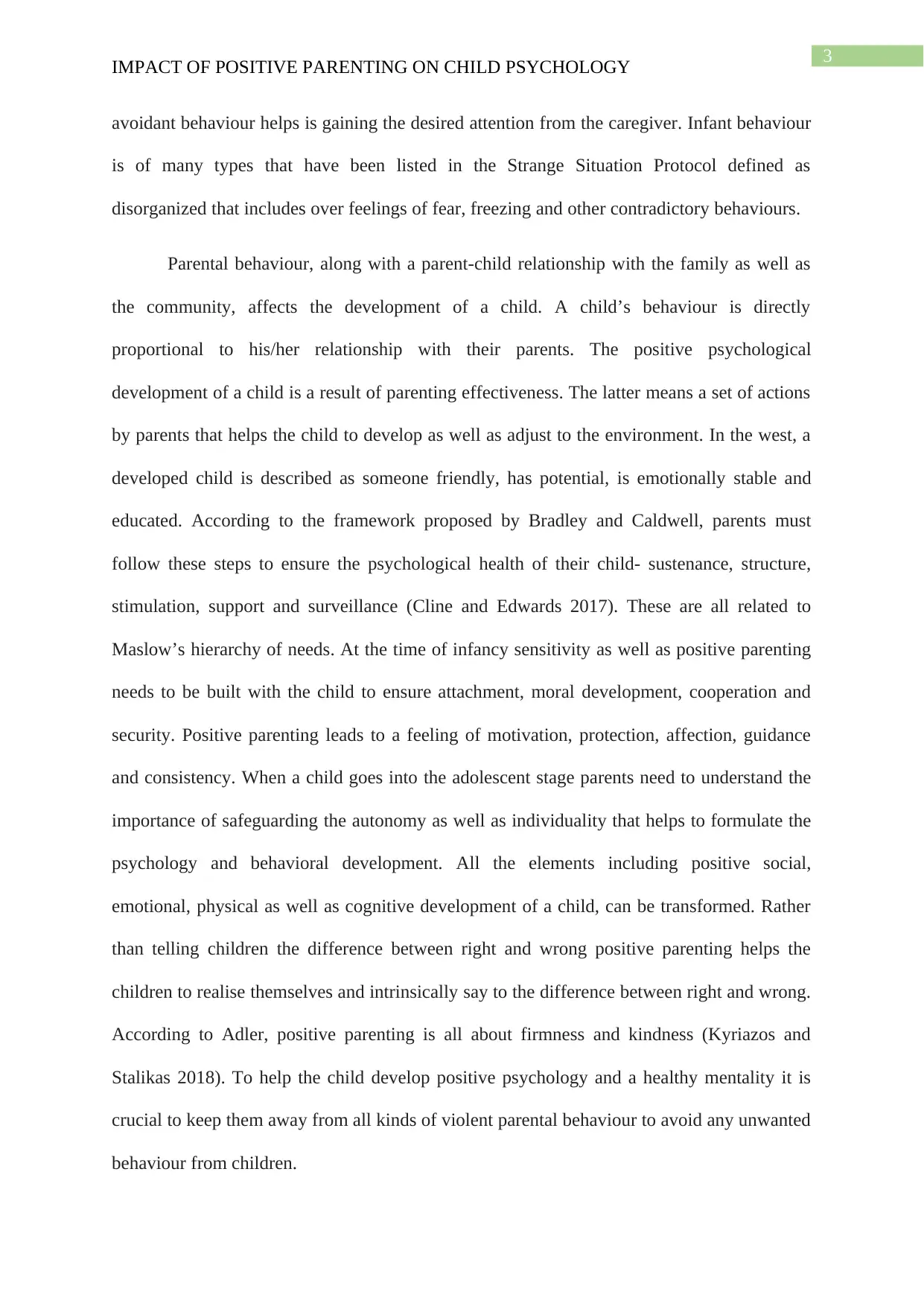
3
IMPACT OF POSITIVE PARENTING ON CHILD PSYCHOLOGY
avoidant behaviour helps is gaining the desired attention from the caregiver. Infant behaviour
is of many types that have been listed in the Strange Situation Protocol defined as
disorganized that includes over feelings of fear, freezing and other contradictory behaviours.
Parental behaviour, along with a parent-child relationship with the family as well as
the community, affects the development of a child. A child’s behaviour is directly
proportional to his/her relationship with their parents. The positive psychological
development of a child is a result of parenting effectiveness. The latter means a set of actions
by parents that helps the child to develop as well as adjust to the environment. In the west, a
developed child is described as someone friendly, has potential, is emotionally stable and
educated. According to the framework proposed by Bradley and Caldwell, parents must
follow these steps to ensure the psychological health of their child- sustenance, structure,
stimulation, support and surveillance (Cline and Edwards 2017). These are all related to
Maslow’s hierarchy of needs. At the time of infancy sensitivity as well as positive parenting
needs to be built with the child to ensure attachment, moral development, cooperation and
security. Positive parenting leads to a feeling of motivation, protection, affection, guidance
and consistency. When a child goes into the adolescent stage parents need to understand the
importance of safeguarding the autonomy as well as individuality that helps to formulate the
psychology and behavioral development. All the elements including positive social,
emotional, physical as well as cognitive development of a child, can be transformed. Rather
than telling children the difference between right and wrong positive parenting helps the
children to realise themselves and intrinsically say to the difference between right and wrong.
According to Adler, positive parenting is all about firmness and kindness (Kyriazos and
Stalikas 2018). To help the child develop positive psychology and a healthy mentality it is
crucial to keep them away from all kinds of violent parental behaviour to avoid any unwanted
behaviour from children.
IMPACT OF POSITIVE PARENTING ON CHILD PSYCHOLOGY
avoidant behaviour helps is gaining the desired attention from the caregiver. Infant behaviour
is of many types that have been listed in the Strange Situation Protocol defined as
disorganized that includes over feelings of fear, freezing and other contradictory behaviours.
Parental behaviour, along with a parent-child relationship with the family as well as
the community, affects the development of a child. A child’s behaviour is directly
proportional to his/her relationship with their parents. The positive psychological
development of a child is a result of parenting effectiveness. The latter means a set of actions
by parents that helps the child to develop as well as adjust to the environment. In the west, a
developed child is described as someone friendly, has potential, is emotionally stable and
educated. According to the framework proposed by Bradley and Caldwell, parents must
follow these steps to ensure the psychological health of their child- sustenance, structure,
stimulation, support and surveillance (Cline and Edwards 2017). These are all related to
Maslow’s hierarchy of needs. At the time of infancy sensitivity as well as positive parenting
needs to be built with the child to ensure attachment, moral development, cooperation and
security. Positive parenting leads to a feeling of motivation, protection, affection, guidance
and consistency. When a child goes into the adolescent stage parents need to understand the
importance of safeguarding the autonomy as well as individuality that helps to formulate the
psychology and behavioral development. All the elements including positive social,
emotional, physical as well as cognitive development of a child, can be transformed. Rather
than telling children the difference between right and wrong positive parenting helps the
children to realise themselves and intrinsically say to the difference between right and wrong.
According to Adler, positive parenting is all about firmness and kindness (Kyriazos and
Stalikas 2018). To help the child develop positive psychology and a healthy mentality it is
crucial to keep them away from all kinds of violent parental behaviour to avoid any unwanted
behaviour from children.
Paraphrase This Document
Need a fresh take? Get an instant paraphrase of this document with our AI Paraphraser
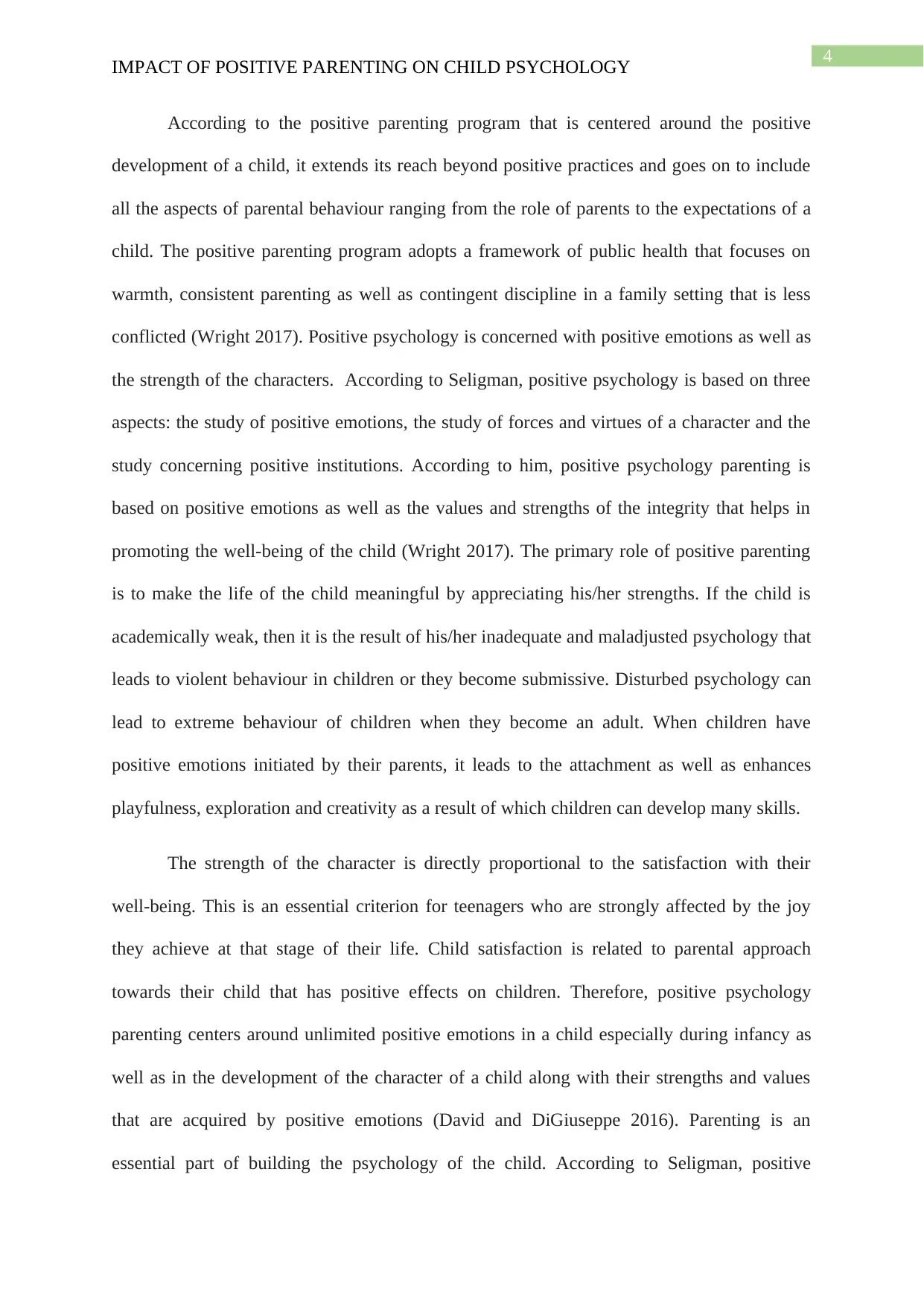
4
IMPACT OF POSITIVE PARENTING ON CHILD PSYCHOLOGY
According to the positive parenting program that is centered around the positive
development of a child, it extends its reach beyond positive practices and goes on to include
all the aspects of parental behaviour ranging from the role of parents to the expectations of a
child. The positive parenting program adopts a framework of public health that focuses on
warmth, consistent parenting as well as contingent discipline in a family setting that is less
conflicted (Wright 2017). Positive psychology is concerned with positive emotions as well as
the strength of the characters. According to Seligman, positive psychology is based on three
aspects: the study of positive emotions, the study of forces and virtues of a character and the
study concerning positive institutions. According to him, positive psychology parenting is
based on positive emotions as well as the values and strengths of the integrity that helps in
promoting the well-being of the child (Wright 2017). The primary role of positive parenting
is to make the life of the child meaningful by appreciating his/her strengths. If the child is
academically weak, then it is the result of his/her inadequate and maladjusted psychology that
leads to violent behaviour in children or they become submissive. Disturbed psychology can
lead to extreme behaviour of children when they become an adult. When children have
positive emotions initiated by their parents, it leads to the attachment as well as enhances
playfulness, exploration and creativity as a result of which children can develop many skills.
The strength of the character is directly proportional to the satisfaction with their
well-being. This is an essential criterion for teenagers who are strongly affected by the joy
they achieve at that stage of their life. Child satisfaction is related to parental approach
towards their child that has positive effects on children. Therefore, positive psychology
parenting centers around unlimited positive emotions in a child especially during infancy as
well as in the development of the character of a child along with their strengths and values
that are acquired by positive emotions (David and DiGiuseppe 2016). Parenting is an
essential part of building the psychology of the child. According to Seligman, positive
IMPACT OF POSITIVE PARENTING ON CHILD PSYCHOLOGY
According to the positive parenting program that is centered around the positive
development of a child, it extends its reach beyond positive practices and goes on to include
all the aspects of parental behaviour ranging from the role of parents to the expectations of a
child. The positive parenting program adopts a framework of public health that focuses on
warmth, consistent parenting as well as contingent discipline in a family setting that is less
conflicted (Wright 2017). Positive psychology is concerned with positive emotions as well as
the strength of the characters. According to Seligman, positive psychology is based on three
aspects: the study of positive emotions, the study of forces and virtues of a character and the
study concerning positive institutions. According to him, positive psychology parenting is
based on positive emotions as well as the values and strengths of the integrity that helps in
promoting the well-being of the child (Wright 2017). The primary role of positive parenting
is to make the life of the child meaningful by appreciating his/her strengths. If the child is
academically weak, then it is the result of his/her inadequate and maladjusted psychology that
leads to violent behaviour in children or they become submissive. Disturbed psychology can
lead to extreme behaviour of children when they become an adult. When children have
positive emotions initiated by their parents, it leads to the attachment as well as enhances
playfulness, exploration and creativity as a result of which children can develop many skills.
The strength of the character is directly proportional to the satisfaction with their
well-being. This is an essential criterion for teenagers who are strongly affected by the joy
they achieve at that stage of their life. Child satisfaction is related to parental approach
towards their child that has positive effects on children. Therefore, positive psychology
parenting centers around unlimited positive emotions in a child especially during infancy as
well as in the development of the character of a child along with their strengths and values
that are acquired by positive emotions (David and DiGiuseppe 2016). Parenting is an
essential part of building the psychology of the child. According to Seligman, positive
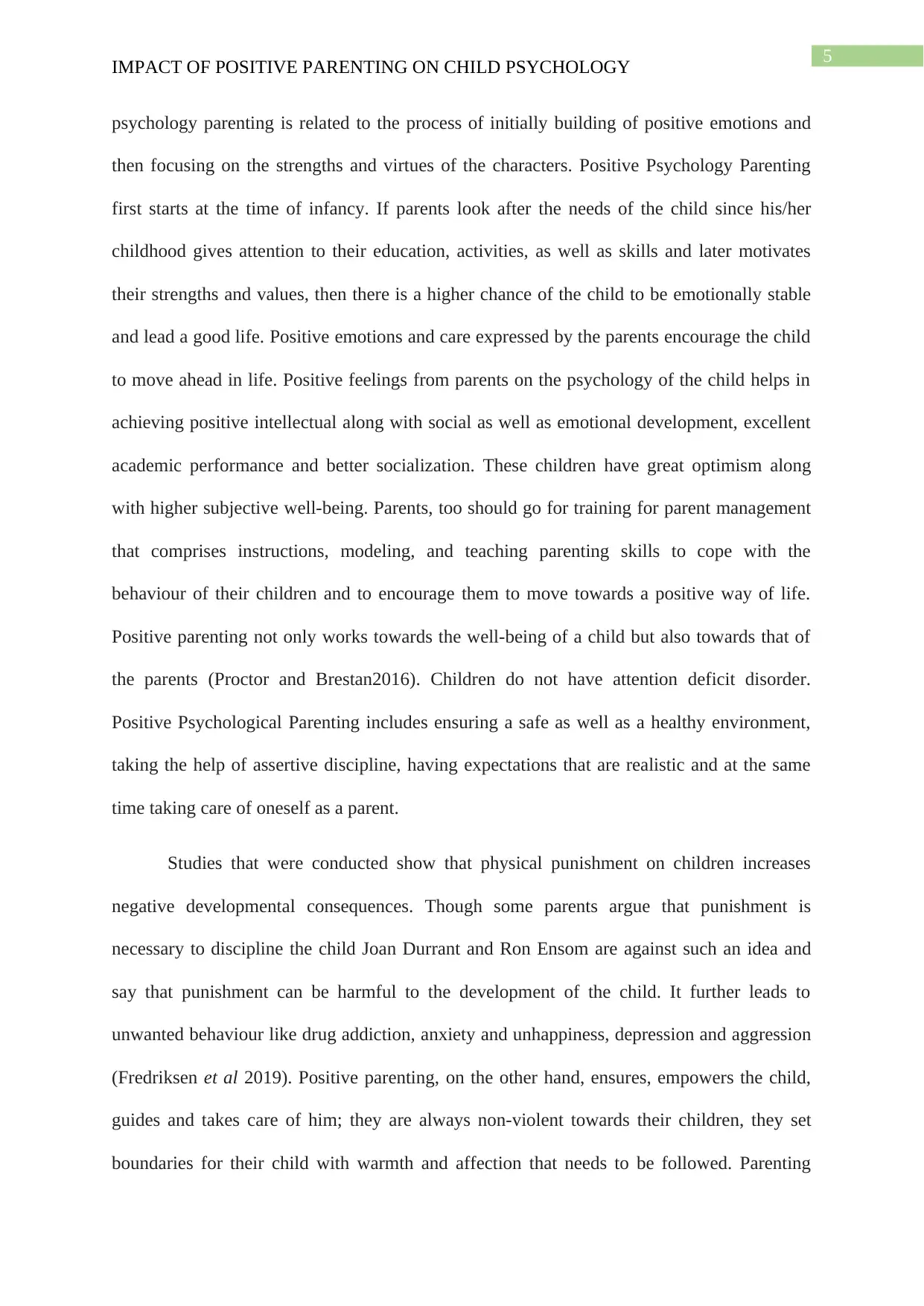
5
IMPACT OF POSITIVE PARENTING ON CHILD PSYCHOLOGY
psychology parenting is related to the process of initially building of positive emotions and
then focusing on the strengths and virtues of the characters. Positive Psychology Parenting
first starts at the time of infancy. If parents look after the needs of the child since his/her
childhood gives attention to their education, activities, as well as skills and later motivates
their strengths and values, then there is a higher chance of the child to be emotionally stable
and lead a good life. Positive emotions and care expressed by the parents encourage the child
to move ahead in life. Positive feelings from parents on the psychology of the child helps in
achieving positive intellectual along with social as well as emotional development, excellent
academic performance and better socialization. These children have great optimism along
with higher subjective well-being. Parents, too should go for training for parent management
that comprises instructions, modeling, and teaching parenting skills to cope with the
behaviour of their children and to encourage them to move towards a positive way of life.
Positive parenting not only works towards the well-being of a child but also towards that of
the parents (Proctor and Brestan2016). Children do not have attention deficit disorder.
Positive Psychological Parenting includes ensuring a safe as well as a healthy environment,
taking the help of assertive discipline, having expectations that are realistic and at the same
time taking care of oneself as a parent.
Studies that were conducted show that physical punishment on children increases
negative developmental consequences. Though some parents argue that punishment is
necessary to discipline the child Joan Durrant and Ron Ensom are against such an idea and
say that punishment can be harmful to the development of the child. It further leads to
unwanted behaviour like drug addiction, anxiety and unhappiness, depression and aggression
(Fredriksen et al 2019). Positive parenting, on the other hand, ensures, empowers the child,
guides and takes care of him; they are always non-violent towards their children, they set
boundaries for their child with warmth and affection that needs to be followed. Parenting
IMPACT OF POSITIVE PARENTING ON CHILD PSYCHOLOGY
psychology parenting is related to the process of initially building of positive emotions and
then focusing on the strengths and virtues of the characters. Positive Psychology Parenting
first starts at the time of infancy. If parents look after the needs of the child since his/her
childhood gives attention to their education, activities, as well as skills and later motivates
their strengths and values, then there is a higher chance of the child to be emotionally stable
and lead a good life. Positive emotions and care expressed by the parents encourage the child
to move ahead in life. Positive feelings from parents on the psychology of the child helps in
achieving positive intellectual along with social as well as emotional development, excellent
academic performance and better socialization. These children have great optimism along
with higher subjective well-being. Parents, too should go for training for parent management
that comprises instructions, modeling, and teaching parenting skills to cope with the
behaviour of their children and to encourage them to move towards a positive way of life.
Positive parenting not only works towards the well-being of a child but also towards that of
the parents (Proctor and Brestan2016). Children do not have attention deficit disorder.
Positive Psychological Parenting includes ensuring a safe as well as a healthy environment,
taking the help of assertive discipline, having expectations that are realistic and at the same
time taking care of oneself as a parent.
Studies that were conducted show that physical punishment on children increases
negative developmental consequences. Though some parents argue that punishment is
necessary to discipline the child Joan Durrant and Ron Ensom are against such an idea and
say that punishment can be harmful to the development of the child. It further leads to
unwanted behaviour like drug addiction, anxiety and unhappiness, depression and aggression
(Fredriksen et al 2019). Positive parenting, on the other hand, ensures, empowers the child,
guides and takes care of him; they are always non-violent towards their children, they set
boundaries for their child with warmth and affection that needs to be followed. Parenting
⊘ This is a preview!⊘
Do you want full access?
Subscribe today to unlock all pages.

Trusted by 1+ million students worldwide
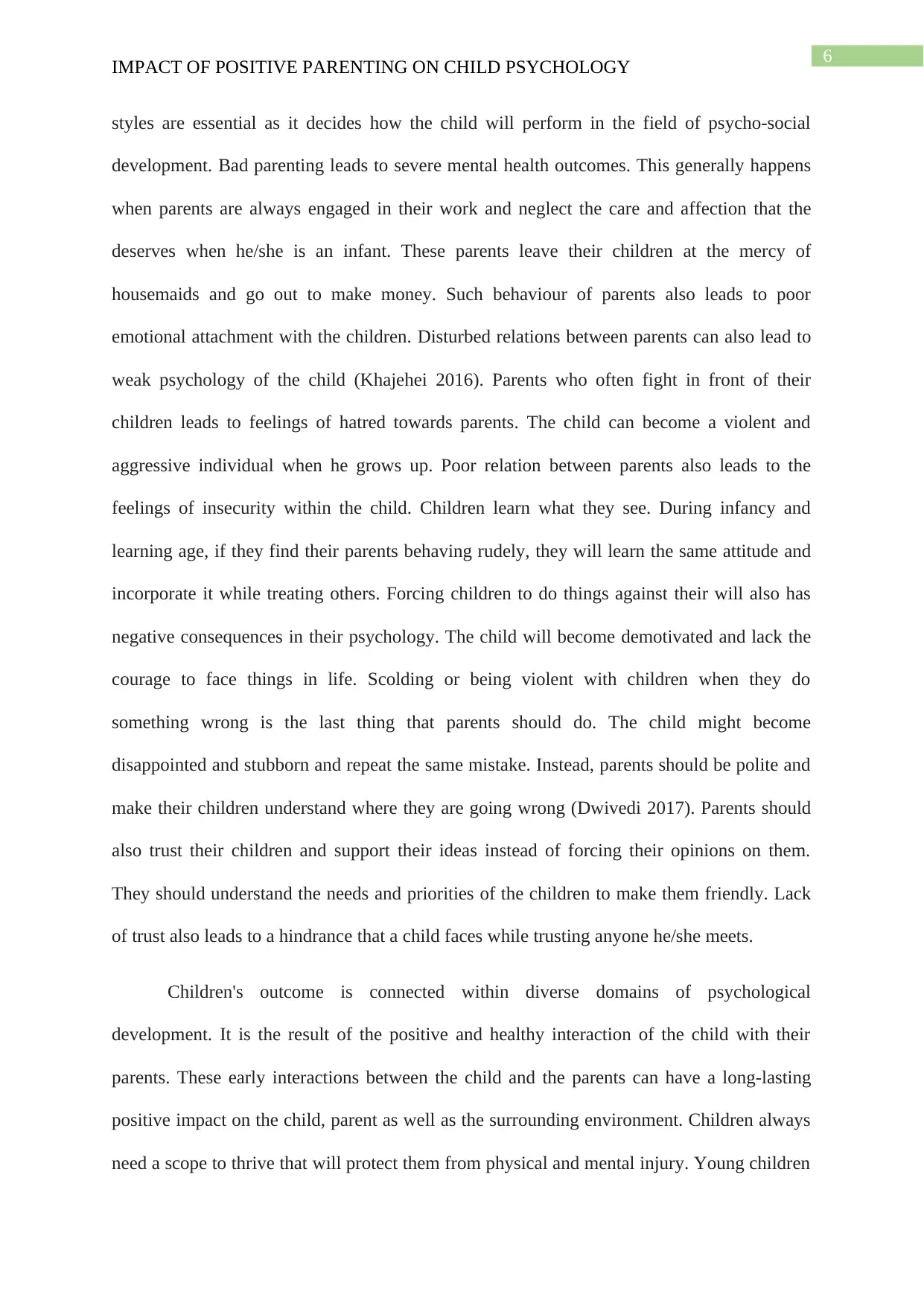
6
IMPACT OF POSITIVE PARENTING ON CHILD PSYCHOLOGY
styles are essential as it decides how the child will perform in the field of psycho-social
development. Bad parenting leads to severe mental health outcomes. This generally happens
when parents are always engaged in their work and neglect the care and affection that the
deserves when he/she is an infant. These parents leave their children at the mercy of
housemaids and go out to make money. Such behaviour of parents also leads to poor
emotional attachment with the children. Disturbed relations between parents can also lead to
weak psychology of the child (Khajehei 2016). Parents who often fight in front of their
children leads to feelings of hatred towards parents. The child can become a violent and
aggressive individual when he grows up. Poor relation between parents also leads to the
feelings of insecurity within the child. Children learn what they see. During infancy and
learning age, if they find their parents behaving rudely, they will learn the same attitude and
incorporate it while treating others. Forcing children to do things against their will also has
negative consequences in their psychology. The child will become demotivated and lack the
courage to face things in life. Scolding or being violent with children when they do
something wrong is the last thing that parents should do. The child might become
disappointed and stubborn and repeat the same mistake. Instead, parents should be polite and
make their children understand where they are going wrong (Dwivedi 2017). Parents should
also trust their children and support their ideas instead of forcing their opinions on them.
They should understand the needs and priorities of the children to make them friendly. Lack
of trust also leads to a hindrance that a child faces while trusting anyone he/she meets.
Children's outcome is connected within diverse domains of psychological
development. It is the result of the positive and healthy interaction of the child with their
parents. These early interactions between the child and the parents can have a long-lasting
positive impact on the child, parent as well as the surrounding environment. Children always
need a scope to thrive that will protect them from physical and mental injury. Young children
IMPACT OF POSITIVE PARENTING ON CHILD PSYCHOLOGY
styles are essential as it decides how the child will perform in the field of psycho-social
development. Bad parenting leads to severe mental health outcomes. This generally happens
when parents are always engaged in their work and neglect the care and affection that the
deserves when he/she is an infant. These parents leave their children at the mercy of
housemaids and go out to make money. Such behaviour of parents also leads to poor
emotional attachment with the children. Disturbed relations between parents can also lead to
weak psychology of the child (Khajehei 2016). Parents who often fight in front of their
children leads to feelings of hatred towards parents. The child can become a violent and
aggressive individual when he grows up. Poor relation between parents also leads to the
feelings of insecurity within the child. Children learn what they see. During infancy and
learning age, if they find their parents behaving rudely, they will learn the same attitude and
incorporate it while treating others. Forcing children to do things against their will also has
negative consequences in their psychology. The child will become demotivated and lack the
courage to face things in life. Scolding or being violent with children when they do
something wrong is the last thing that parents should do. The child might become
disappointed and stubborn and repeat the same mistake. Instead, parents should be polite and
make their children understand where they are going wrong (Dwivedi 2017). Parents should
also trust their children and support their ideas instead of forcing their opinions on them.
They should understand the needs and priorities of the children to make them friendly. Lack
of trust also leads to a hindrance that a child faces while trusting anyone he/she meets.
Children's outcome is connected within diverse domains of psychological
development. It is the result of the positive and healthy interaction of the child with their
parents. These early interactions between the child and the parents can have a long-lasting
positive impact on the child, parent as well as the surrounding environment. Children always
need a scope to thrive that will protect them from physical and mental injury. Young children
Paraphrase This Document
Need a fresh take? Get an instant paraphrase of this document with our AI Paraphraser
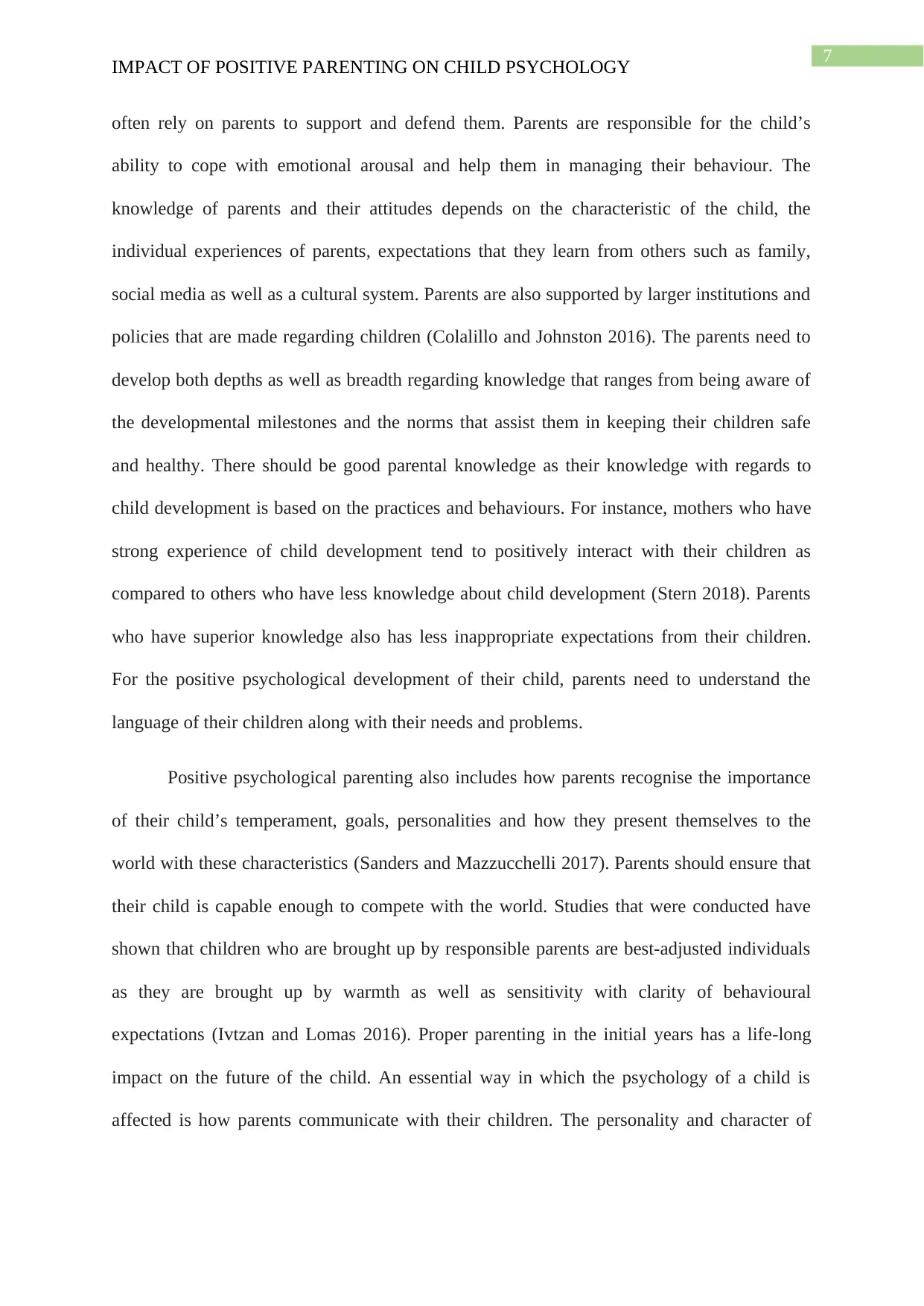
7
IMPACT OF POSITIVE PARENTING ON CHILD PSYCHOLOGY
often rely on parents to support and defend them. Parents are responsible for the child’s
ability to cope with emotional arousal and help them in managing their behaviour. The
knowledge of parents and their attitudes depends on the characteristic of the child, the
individual experiences of parents, expectations that they learn from others such as family,
social media as well as a cultural system. Parents are also supported by larger institutions and
policies that are made regarding children (Colalillo and Johnston 2016). The parents need to
develop both depths as well as breadth regarding knowledge that ranges from being aware of
the developmental milestones and the norms that assist them in keeping their children safe
and healthy. There should be good parental knowledge as their knowledge with regards to
child development is based on the practices and behaviours. For instance, mothers who have
strong experience of child development tend to positively interact with their children as
compared to others who have less knowledge about child development (Stern 2018). Parents
who have superior knowledge also has less inappropriate expectations from their children.
For the positive psychological development of their child, parents need to understand the
language of their children along with their needs and problems.
Positive psychological parenting also includes how parents recognise the importance
of their child’s temperament, goals, personalities and how they present themselves to the
world with these characteristics (Sanders and Mazzucchelli 2017). Parents should ensure that
their child is capable enough to compete with the world. Studies that were conducted have
shown that children who are brought up by responsible parents are best-adjusted individuals
as they are brought up by warmth as well as sensitivity with clarity of behavioural
expectations (Ivtzan and Lomas 2016). Proper parenting in the initial years has a life-long
impact on the future of the child. An essential way in which the psychology of a child is
affected is how parents communicate with their children. The personality and character of
IMPACT OF POSITIVE PARENTING ON CHILD PSYCHOLOGY
often rely on parents to support and defend them. Parents are responsible for the child’s
ability to cope with emotional arousal and help them in managing their behaviour. The
knowledge of parents and their attitudes depends on the characteristic of the child, the
individual experiences of parents, expectations that they learn from others such as family,
social media as well as a cultural system. Parents are also supported by larger institutions and
policies that are made regarding children (Colalillo and Johnston 2016). The parents need to
develop both depths as well as breadth regarding knowledge that ranges from being aware of
the developmental milestones and the norms that assist them in keeping their children safe
and healthy. There should be good parental knowledge as their knowledge with regards to
child development is based on the practices and behaviours. For instance, mothers who have
strong experience of child development tend to positively interact with their children as
compared to others who have less knowledge about child development (Stern 2018). Parents
who have superior knowledge also has less inappropriate expectations from their children.
For the positive psychological development of their child, parents need to understand the
language of their children along with their needs and problems.
Positive psychological parenting also includes how parents recognise the importance
of their child’s temperament, goals, personalities and how they present themselves to the
world with these characteristics (Sanders and Mazzucchelli 2017). Parents should ensure that
their child is capable enough to compete with the world. Studies that were conducted have
shown that children who are brought up by responsible parents are best-adjusted individuals
as they are brought up by warmth as well as sensitivity with clarity of behavioural
expectations (Ivtzan and Lomas 2016). Proper parenting in the initial years has a life-long
impact on the future of the child. An essential way in which the psychology of a child is
affected is how parents communicate with their children. The personality and character of
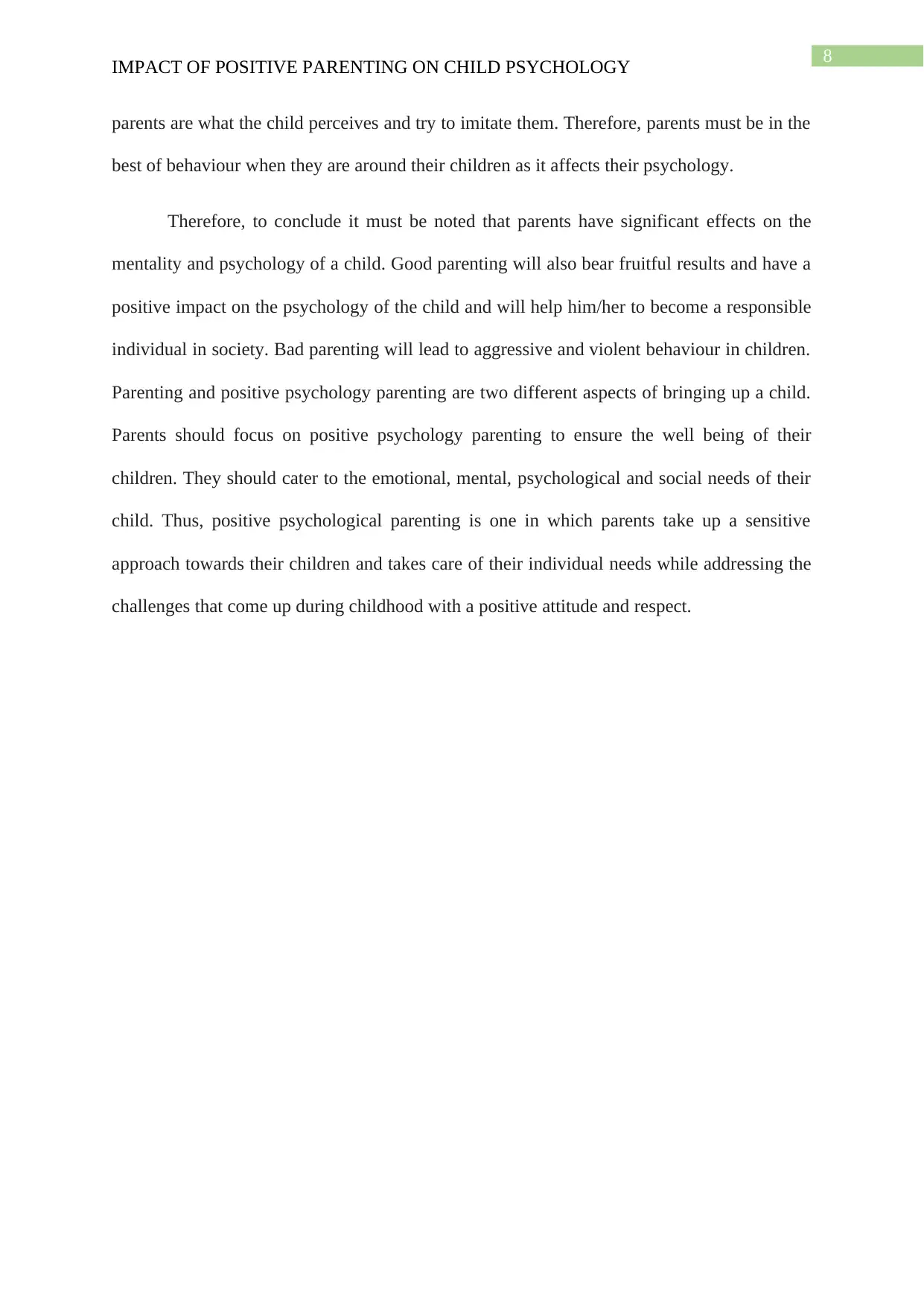
8
IMPACT OF POSITIVE PARENTING ON CHILD PSYCHOLOGY
parents are what the child perceives and try to imitate them. Therefore, parents must be in the
best of behaviour when they are around their children as it affects their psychology.
Therefore, to conclude it must be noted that parents have significant effects on the
mentality and psychology of a child. Good parenting will also bear fruitful results and have a
positive impact on the psychology of the child and will help him/her to become a responsible
individual in society. Bad parenting will lead to aggressive and violent behaviour in children.
Parenting and positive psychology parenting are two different aspects of bringing up a child.
Parents should focus on positive psychology parenting to ensure the well being of their
children. They should cater to the emotional, mental, psychological and social needs of their
child. Thus, positive psychological parenting is one in which parents take up a sensitive
approach towards their children and takes care of their individual needs while addressing the
challenges that come up during childhood with a positive attitude and respect.
IMPACT OF POSITIVE PARENTING ON CHILD PSYCHOLOGY
parents are what the child perceives and try to imitate them. Therefore, parents must be in the
best of behaviour when they are around their children as it affects their psychology.
Therefore, to conclude it must be noted that parents have significant effects on the
mentality and psychology of a child. Good parenting will also bear fruitful results and have a
positive impact on the psychology of the child and will help him/her to become a responsible
individual in society. Bad parenting will lead to aggressive and violent behaviour in children.
Parenting and positive psychology parenting are two different aspects of bringing up a child.
Parents should focus on positive psychology parenting to ensure the well being of their
children. They should cater to the emotional, mental, psychological and social needs of their
child. Thus, positive psychological parenting is one in which parents take up a sensitive
approach towards their children and takes care of their individual needs while addressing the
challenges that come up during childhood with a positive attitude and respect.
⊘ This is a preview!⊘
Do you want full access?
Subscribe today to unlock all pages.

Trusted by 1+ million students worldwide
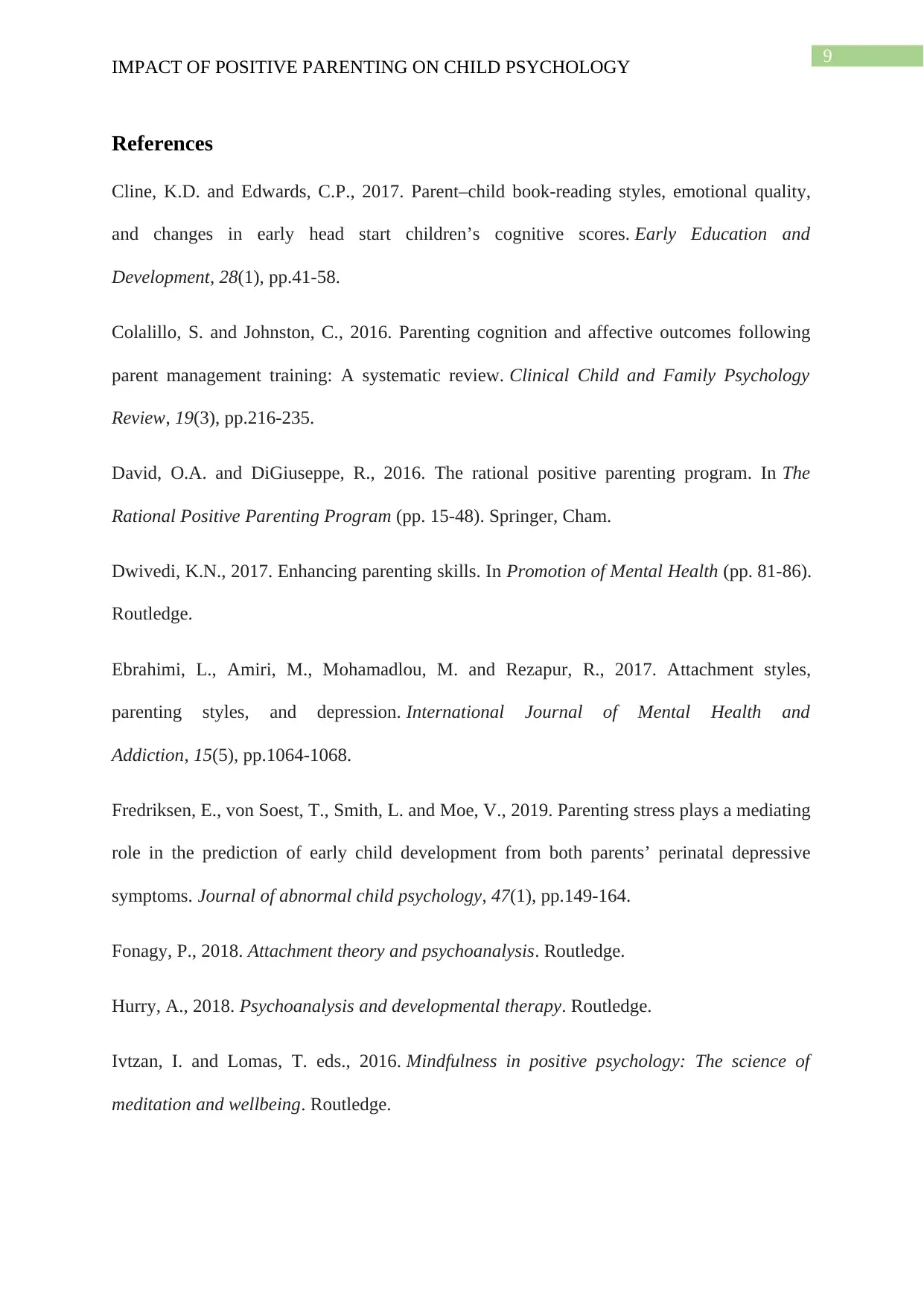
9
IMPACT OF POSITIVE PARENTING ON CHILD PSYCHOLOGY
References
Cline, K.D. and Edwards, C.P., 2017. Parent–child book-reading styles, emotional quality,
and changes in early head start children’s cognitive scores. Early Education and
Development, 28(1), pp.41-58.
Colalillo, S. and Johnston, C., 2016. Parenting cognition and affective outcomes following
parent management training: A systematic review. Clinical Child and Family Psychology
Review, 19(3), pp.216-235.
David, O.A. and DiGiuseppe, R., 2016. The rational positive parenting program. In The
Rational Positive Parenting Program (pp. 15-48). Springer, Cham.
Dwivedi, K.N., 2017. Enhancing parenting skills. In Promotion of Mental Health (pp. 81-86).
Routledge.
Ebrahimi, L., Amiri, M., Mohamadlou, M. and Rezapur, R., 2017. Attachment styles,
parenting styles, and depression. International Journal of Mental Health and
Addiction, 15(5), pp.1064-1068.
Fredriksen, E., von Soest, T., Smith, L. and Moe, V., 2019. Parenting stress plays a mediating
role in the prediction of early child development from both parents’ perinatal depressive
symptoms. Journal of abnormal child psychology, 47(1), pp.149-164.
Fonagy, P., 2018. Attachment theory and psychoanalysis. Routledge.
Hurry, A., 2018. Psychoanalysis and developmental therapy. Routledge.
Ivtzan, I. and Lomas, T. eds., 2016. Mindfulness in positive psychology: The science of
meditation and wellbeing. Routledge.
IMPACT OF POSITIVE PARENTING ON CHILD PSYCHOLOGY
References
Cline, K.D. and Edwards, C.P., 2017. Parent–child book-reading styles, emotional quality,
and changes in early head start children’s cognitive scores. Early Education and
Development, 28(1), pp.41-58.
Colalillo, S. and Johnston, C., 2016. Parenting cognition and affective outcomes following
parent management training: A systematic review. Clinical Child and Family Psychology
Review, 19(3), pp.216-235.
David, O.A. and DiGiuseppe, R., 2016. The rational positive parenting program. In The
Rational Positive Parenting Program (pp. 15-48). Springer, Cham.
Dwivedi, K.N., 2017. Enhancing parenting skills. In Promotion of Mental Health (pp. 81-86).
Routledge.
Ebrahimi, L., Amiri, M., Mohamadlou, M. and Rezapur, R., 2017. Attachment styles,
parenting styles, and depression. International Journal of Mental Health and
Addiction, 15(5), pp.1064-1068.
Fredriksen, E., von Soest, T., Smith, L. and Moe, V., 2019. Parenting stress plays a mediating
role in the prediction of early child development from both parents’ perinatal depressive
symptoms. Journal of abnormal child psychology, 47(1), pp.149-164.
Fonagy, P., 2018. Attachment theory and psychoanalysis. Routledge.
Hurry, A., 2018. Psychoanalysis and developmental therapy. Routledge.
Ivtzan, I. and Lomas, T. eds., 2016. Mindfulness in positive psychology: The science of
meditation and wellbeing. Routledge.
Paraphrase This Document
Need a fresh take? Get an instant paraphrase of this document with our AI Paraphraser
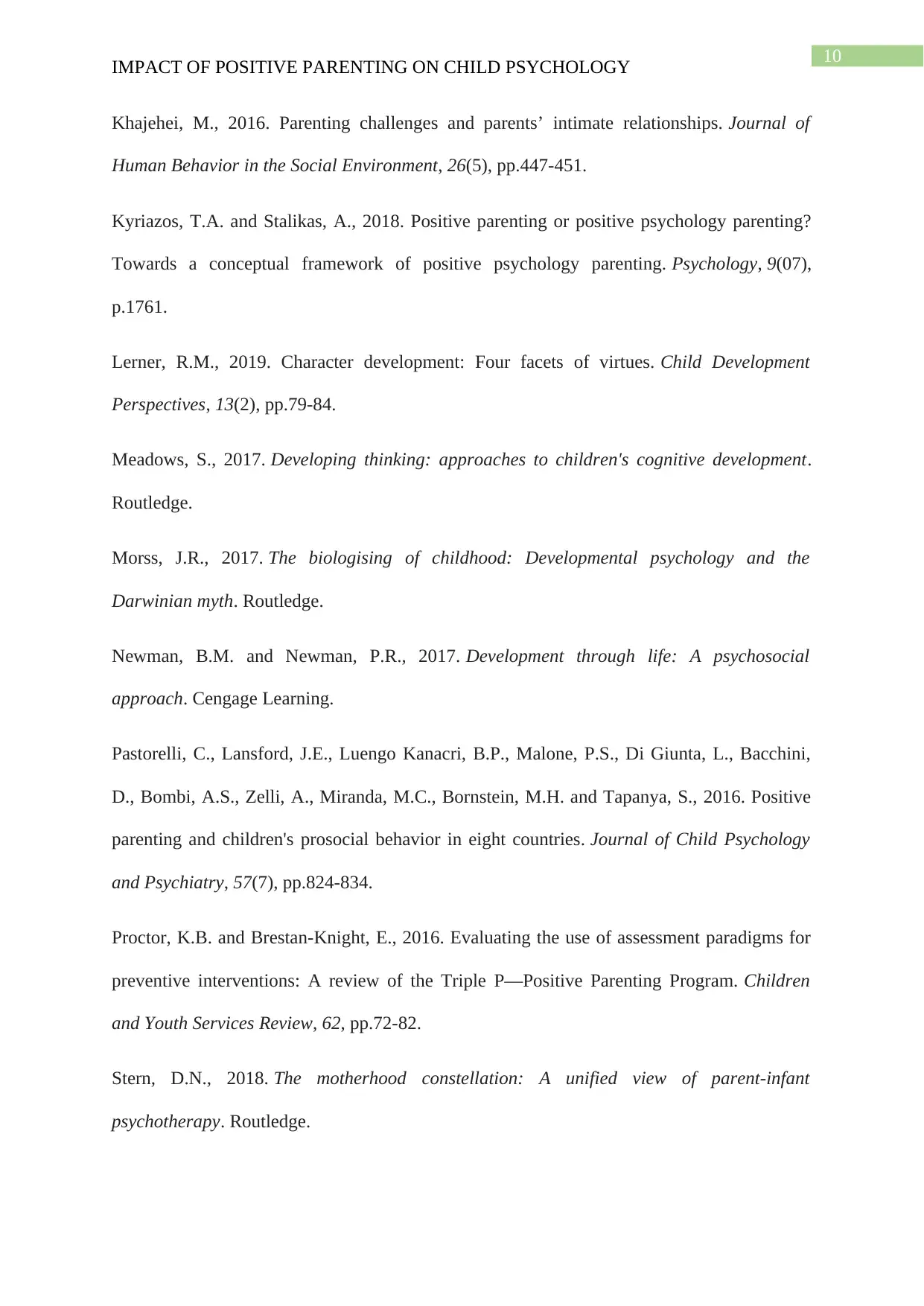
10
IMPACT OF POSITIVE PARENTING ON CHILD PSYCHOLOGY
Khajehei, M., 2016. Parenting challenges and parents’ intimate relationships. Journal of
Human Behavior in the Social Environment, 26(5), pp.447-451.
Kyriazos, T.A. and Stalikas, A., 2018. Positive parenting or positive psychology parenting?
Towards a conceptual framework of positive psychology parenting. Psychology, 9(07),
p.1761.
Lerner, R.M., 2019. Character development: Four facets of virtues. Child Development
Perspectives, 13(2), pp.79-84.
Meadows, S., 2017. Developing thinking: approaches to children's cognitive development.
Routledge.
Morss, J.R., 2017. The biologising of childhood: Developmental psychology and the
Darwinian myth. Routledge.
Newman, B.M. and Newman, P.R., 2017. Development through life: A psychosocial
approach. Cengage Learning.
Pastorelli, C., Lansford, J.E., Luengo Kanacri, B.P., Malone, P.S., Di Giunta, L., Bacchini,
D., Bombi, A.S., Zelli, A., Miranda, M.C., Bornstein, M.H. and Tapanya, S., 2016. Positive
parenting and children's prosocial behavior in eight countries. Journal of Child Psychology
and Psychiatry, 57(7), pp.824-834.
Proctor, K.B. and Brestan-Knight, E., 2016. Evaluating the use of assessment paradigms for
preventive interventions: A review of the Triple P—Positive Parenting Program. Children
and Youth Services Review, 62, pp.72-82.
Stern, D.N., 2018. The motherhood constellation: A unified view of parent-infant
psychotherapy. Routledge.
IMPACT OF POSITIVE PARENTING ON CHILD PSYCHOLOGY
Khajehei, M., 2016. Parenting challenges and parents’ intimate relationships. Journal of
Human Behavior in the Social Environment, 26(5), pp.447-451.
Kyriazos, T.A. and Stalikas, A., 2018. Positive parenting or positive psychology parenting?
Towards a conceptual framework of positive psychology parenting. Psychology, 9(07),
p.1761.
Lerner, R.M., 2019. Character development: Four facets of virtues. Child Development
Perspectives, 13(2), pp.79-84.
Meadows, S., 2017. Developing thinking: approaches to children's cognitive development.
Routledge.
Morss, J.R., 2017. The biologising of childhood: Developmental psychology and the
Darwinian myth. Routledge.
Newman, B.M. and Newman, P.R., 2017. Development through life: A psychosocial
approach. Cengage Learning.
Pastorelli, C., Lansford, J.E., Luengo Kanacri, B.P., Malone, P.S., Di Giunta, L., Bacchini,
D., Bombi, A.S., Zelli, A., Miranda, M.C., Bornstein, M.H. and Tapanya, S., 2016. Positive
parenting and children's prosocial behavior in eight countries. Journal of Child Psychology
and Psychiatry, 57(7), pp.824-834.
Proctor, K.B. and Brestan-Knight, E., 2016. Evaluating the use of assessment paradigms for
preventive interventions: A review of the Triple P—Positive Parenting Program. Children
and Youth Services Review, 62, pp.72-82.
Stern, D.N., 2018. The motherhood constellation: A unified view of parent-infant
psychotherapy. Routledge.
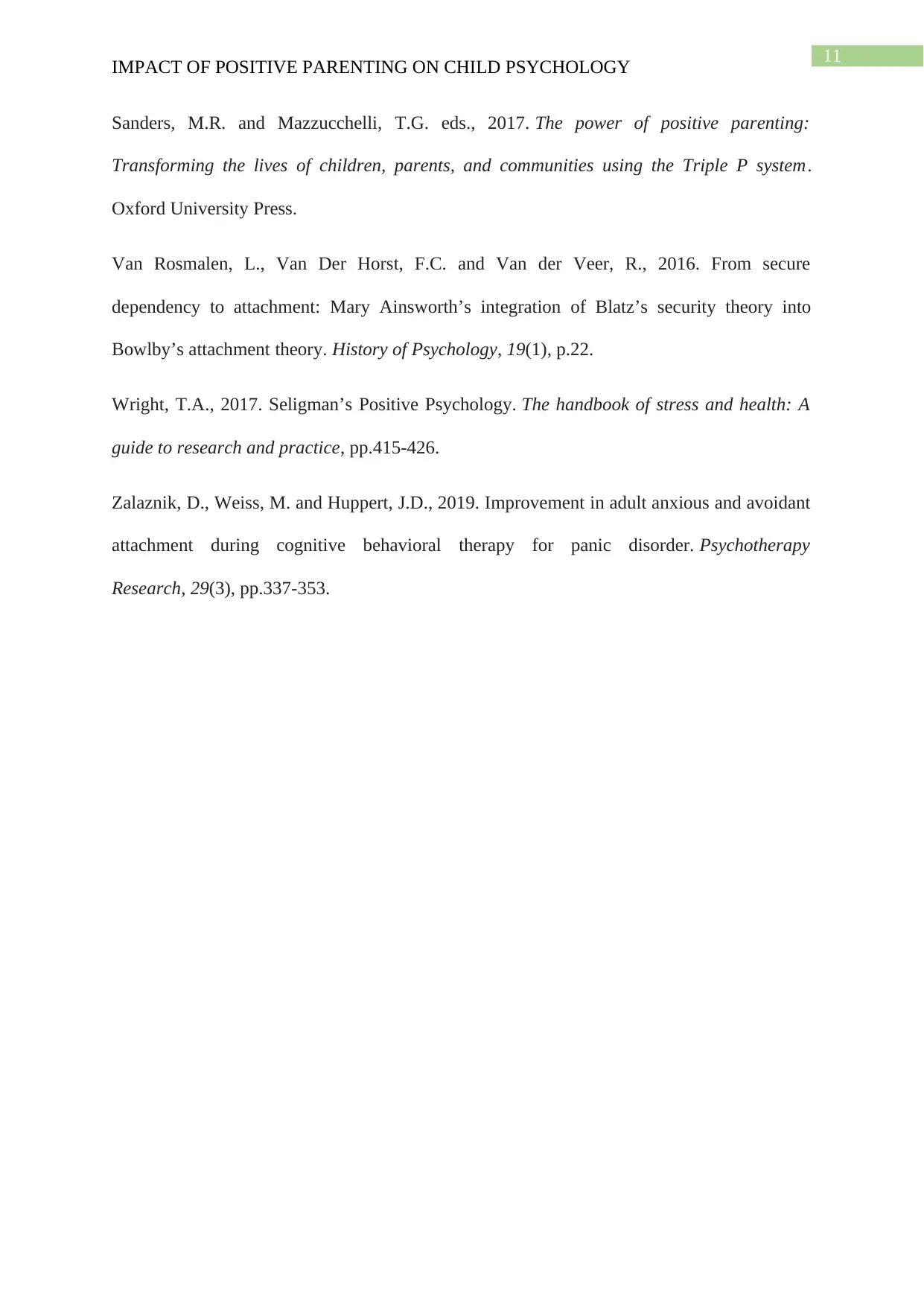
11
IMPACT OF POSITIVE PARENTING ON CHILD PSYCHOLOGY
Sanders, M.R. and Mazzucchelli, T.G. eds., 2017. The power of positive parenting:
Transforming the lives of children, parents, and communities using the Triple P system.
Oxford University Press.
Van Rosmalen, L., Van Der Horst, F.C. and Van der Veer, R., 2016. From secure
dependency to attachment: Mary Ainsworth’s integration of Blatz’s security theory into
Bowlby’s attachment theory. History of Psychology, 19(1), p.22.
Wright, T.A., 2017. Seligman’s Positive Psychology. The handbook of stress and health: A
guide to research and practice, pp.415-426.
Zalaznik, D., Weiss, M. and Huppert, J.D., 2019. Improvement in adult anxious and avoidant
attachment during cognitive behavioral therapy for panic disorder. Psychotherapy
Research, 29(3), pp.337-353.
IMPACT OF POSITIVE PARENTING ON CHILD PSYCHOLOGY
Sanders, M.R. and Mazzucchelli, T.G. eds., 2017. The power of positive parenting:
Transforming the lives of children, parents, and communities using the Triple P system.
Oxford University Press.
Van Rosmalen, L., Van Der Horst, F.C. and Van der Veer, R., 2016. From secure
dependency to attachment: Mary Ainsworth’s integration of Blatz’s security theory into
Bowlby’s attachment theory. History of Psychology, 19(1), p.22.
Wright, T.A., 2017. Seligman’s Positive Psychology. The handbook of stress and health: A
guide to research and practice, pp.415-426.
Zalaznik, D., Weiss, M. and Huppert, J.D., 2019. Improvement in adult anxious and avoidant
attachment during cognitive behavioral therapy for panic disorder. Psychotherapy
Research, 29(3), pp.337-353.
⊘ This is a preview!⊘
Do you want full access?
Subscribe today to unlock all pages.

Trusted by 1+ million students worldwide
1 out of 12
Related Documents
Your All-in-One AI-Powered Toolkit for Academic Success.
+13062052269
info@desklib.com
Available 24*7 on WhatsApp / Email
![[object Object]](/_next/static/media/star-bottom.7253800d.svg)
Unlock your academic potential
Copyright © 2020–2026 A2Z Services. All Rights Reserved. Developed and managed by ZUCOL.





